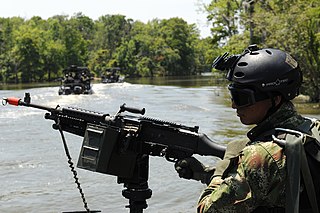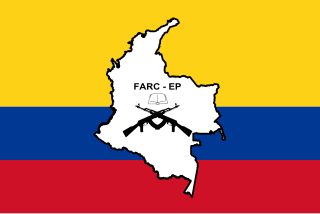
Ingrid Betancourt Pulecio is a Colombian-French politician, former senator and anti-corruption activist, especially opposing political corruption.

Humberto de la Calle Lombana is a Colombian lawyer and politician. He served as Vice President of Colombia from 1994 to 1997. De La Calle served in the cabinet as Interior Minister under two Presidents, Andrés Pastrana and César Gaviria. He also served as Ambassador to Spain and the United Kingdom. After 2003, De La Calle worked at his own Law firm which specialises in advising and representing international clients in Colombia. In October 2012 he was appointed by President Juan Manuel Santos as the chief negotiator in the peace process with the FARC.
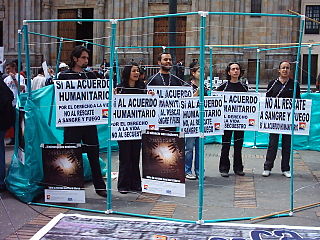
The Humanitarian Exchange or Humanitarian Accord referred to a possible accord to exchange hostages for prisoners between the Revolutionary Armed Forces of Colombia (FARC) guerrilla group and the Government of Colombia.

Colombia–Venezuela relations refers to the diplomatic relations between the Republic of Colombia and the Bolivarian Republic of Venezuela. The relationship has developed since the early 16th century, when Spanish empire colonizers created the Province of Santa Marta and the Province of New Andalucia. The countries share a history for achieving their independence under Simón Bolívar and becoming one nation—the Gran Colombia—which dissolved in the 19th century. Following then, the overall relationship between the two countries has vacillated between cooperation and bilateral struggle.
Operation Emmanuel was a humanitarian operation that rescued politician Clara Rojas, her son Emmanuel, and former senator Consuelo González from the Revolutionary Armed Forces of Colombia (FARC) in Colombia. The operation was proposed and set up by Venezuelan President Hugo Chávez, with the permission of the Colombian government of Álvaro Uribe. Chávez's plan was supported by the governments of Argentina, Bolivia, Brazil, Ecuador, and France, as well as the Red Cross, which also participated in the operation. Venezuelan aircraft were flown to an airport in the Colombian town of Villavicencio, were resupplied, and from there flew to the secret rescue point set up by the FARC. On December 26, 2007, through the Minister of Foreign Affairs, the Colombian government approved the mission, only requesting that the aircraft used for the operations were labelled with Red Cross insignias.
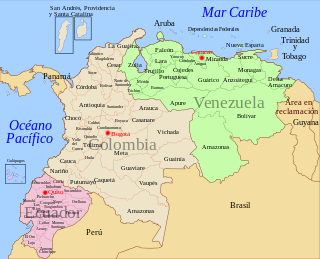
The 2008 Andean diplomatic crisis was a diplomatic stand-off between the South American countries of Ecuador, Colombia and Venezuela. It began with an incursion into Ecuadorian territory across the Putumayo River by the Colombian military on March 1, 2008, leading to the deaths of over twenty militants, including Raúl Reyes and sixteen other members of the Revolutionary Armed Forces of Colombia (FARC). This incursion led to increased tension between Colombia and Ecuador and the movement of Venezuelan and Ecuadorian troops to their borders with Colombia.
ANNCOL is a non-commercial alternative news agency based in Stockholm, Sweden. It was founded in 1996 by Latin American and European journalists and maintains inttermitently a web portal since May, 1998. Its aims are "... to inform about Colombia... to be a voice for the voiceless sectors of Colombia and to provide a platform for ... actions of popular movements, trade unions and the progressive communities of the Latin American countries... that are fighting against neoliberalism and the exploitation of the people".
The El Aro massacre was a massacre in Colombia which occurred on October 22, 1997 in the municipality of Ituango, Department of Antioquia. 15 individuals accused of being leftist supporters of FARC were massacred by paramilitary groups with support from members of the Colombian Army. Perpetrators also raped women, burned down 43 houses, stole cattle and forcibly displaced 900 people.

Presidential elections were held in Colombia in 2010. They took place under a two-round system, with an initial vote held on May 30 and a second poll held three weeks later on June 20. A referendum proposal that would have allowed incumbent President Álvaro Uribe the opportunity to run for a third term was rejected by the Constitutional Court of Colombia in a 7–2 ruling on February 26, 2010. Because no candidate received a majority of the votes cast in the May 30 poll, the candidates with the two highest vote totals competed in a runoff election on June 20: Juan Manuel Santos of the liberal-conservative Social Party of National Unity which unites supporters of former President Uribe, and Antanas Mockus from the Green Party. Santos won the election with 69% of the votes.
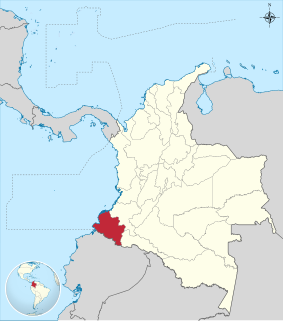
The Nariño massacres were two massacres of indigenous Awá people in the Nariño Department of Colombia perpetrated by members of the rebel Revolutionary Armed Forces of Colombia (FARC) in February 2009. A total of 27 Awás were massacred, including women and young children.
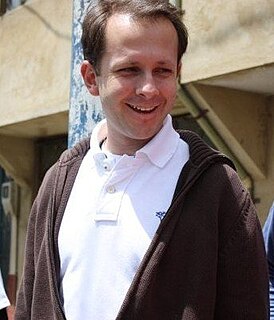
Andrés Felipe Arias Leiva is a Colombian economist, sentenced to 17 years and 4 months of prison for a corruption scandal during his time as Minister of Agriculture. He served as the 8th Minister of Agriculture and Rural Development of Colombia from 2005 to 2009, and was a candidate for the Conservative Party nomination in the 2010 Colombian presidential election, ultimately losing to Noemí Sanín Posada.

Presidential elections were held in Colombia on May 25, 2014. Since no candidate received 50% of the vote in the first round, a run-off between the two candidates with the most votes took place three weeks later on June 15, 2014. According to the official figures released by the National Registry office, as of May 22, 2014 32,975,158 Colombians were registered and entitled to vote in the 2014 presidential election, including 545,976 Colombians resident abroad. Incumbent president Juan Manuel Santos was allowed to run for a second consecutive term. In the first round, Santos and Óscar Iván Zuluaga of the Democratic Center were the two highest-polling candidates and were the contestants in the June 15 run-off. In the second round, Santos was re-elected president, gaining 50.95% of the vote compared with 45.00% for Zuluaga.
The Colombian peace process refers to the peace process between the Colombian government of President Juan Manuel Santos and the Revolutionary Armed Forces of Colombia (FARC–EP) to bring an end to the Colombian conflict. Negotiations began in September 2012, and mainly took place in Havana, Cuba. Negotiators announced a final agreement to end the conflict and build a lasting peace on August 24, 2016. However, a referendum to ratify the deal on October 2, 2016 was unsuccessful after 50.2% of voters voted against the agreement with 49.8% voting in favor. Afterward, the Colombian government and the FARC signed a revised peace deal on November 24 and sent it to Congress for ratification instead of conducting a second referendum. Both houses of Congress ratified the revised peace agreement on November 29–30, 2016, thus marking an end to the conflict.
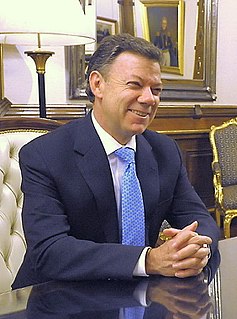
The 2016 Nobel Peace Prize was awarded to the President of Colombia Juan Manuel Santos "for his resolute efforts to bring the country’s more than 50-year-long civil war to an end, a war that has cost the lives of at least 220,000 Colombians and displaced close to six million people." The conflict is the longest running war, and last remaining guerrilla struggle, in the Americas. The Nobel Peace Prize is awarded annually to those who have "done the most or the best work for fraternity between nations, for the abolition or reduction of standing armies and for the holding and promotion of peace congresses". The announcement was made on 7 October at a press conference at the Nobel Peace Center, and the formal award ceremony took place on 10 December at the Oslo City Hall.

The Common Alternative Revolutionary Force is a communist political party in Colombia, established in 2017 as the political successor of the former rebel group the Revolutionary Armed Forces of Colombia (FARC). The peace accords agreed upon by the Revolutionary Armed Forces of Colombia and the Colombian government in 2016 provided for the FARC's participation in politics as a legal, registered political party following its successful disarmament.
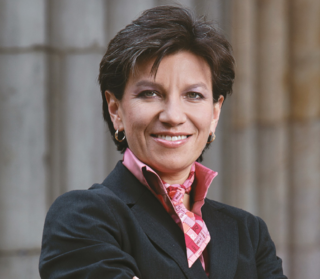
Claudia Nayibe López Hernández is a Colombian politician. She was a Senator of the Republic of Colombia and was the vice-presidential candidate in the 2018 presidential election for the Green Alliance party.
